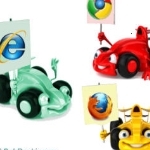Practical tips for improving the performance of your browser.–PC Pitstop.
Speed Up Your Browser
By Bob Rankin
When it seems like Web pages are “taking forever” to display, most people assume the problem is a slow computer or flaky Internet connection. But often, it’s a Web browser that is performing sluggishly. A little maintenance can speed things up. Here is how browsers bog down and some practical tips for restoring the pop to your page loads…
Slow Browsing? Here’s Help.
Several factors can contribute to poor performance when browsing the Web. If you’ve already read my articles on how to speed up Windows, and tips to measure or improve your Internet speeds (see sidebar below), then we can focus on your Web browser, whether it’s Internet Explorer, Google Chrome, Firefox, or Opera.
Let’s start with memory. Like any other program, a browser needs enough working memory (physical RAM) to do its job without constantly swapping data to and from the virtual memory pool on your hard drive. Close unnecessary programs while using your browser, to free up RAM and minimize disk-swapping.
Speed Up Your Browser
If your system is short on RAM, consider adding more. I recommend a minimum of 4GB of RAM for most users. My article How to Upgrade Memory to Boost Performance will show you how to find out how much RAM memory you have now, and how to easily add more.
Some browsers need more working RAM than others; Internet Explorer and Google Chrome are notorious RAM hogs, especially if you keep more than 5 tabs open. Opera and Firefox have made some big strides in recent years on conserving RAM. If you typically surf with just 1 or 2 tabs open, it won’t matter much which browser you use. But if you like to have 5, 10 or 20 tabs open at once, switching to Firefox will make a difference.
RAM “cleaners” and “optimizers” are often recommended to free up idle RAM, defragment RAM, and generally make the most of available RAM. Such utilities may be marginally effective on older PCs running Windows 98, XP, or Vista, but Windows 7 and 8 have very good memory management modules. Third-party utilities don’t make an improvement that’s worth their extra overhead and the complexity they add to your system, in my opinion.
Article Continued Here
Excerpt shared with permission from Bob Rankin.




